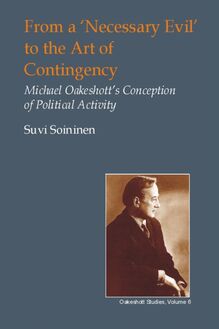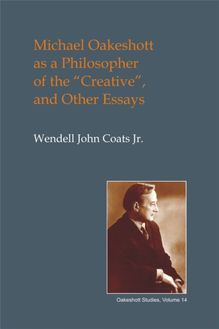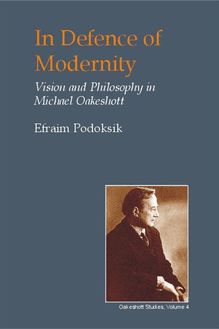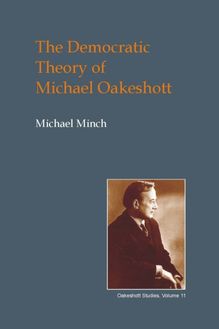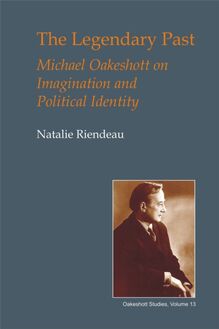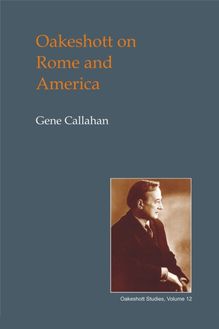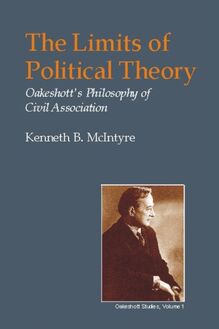In Defence of Modernity , livre ebook
178
pages
English
Ebooks
2013
Vous pourrez modifier la taille du texte de cet ouvrage
Obtenez un accès à la bibliothèque pour le consulter en ligne En savoir plus
Découvre YouScribe en t'inscrivant gratuitement
Découvre YouScribe en t'inscrivant gratuitement
178
pages
English
Ebooks
2013
Vous pourrez modifier la taille du texte de cet ouvrage
Obtenez un accès à la bibliothèque pour le consulter en ligne En savoir plus
Publié par
Date de parution
14 mai 2013
Nombre de lectures
0
EAN13
9781845404673
Langue
English
Publié par
Date de parution
14 mai 2013
Nombre de lectures
0
EAN13
9781845404673
Langue
English
Title page
In Defence of Modernity
Vision and Philosophy in Michael Oakeshott
Efraim Podoksik
Copyright page
Copyright © Efraim Podoksik, 2003
The moral rights of the authors have been asserted
No part of any contribution may be reproduced in any form without permission, except for the quotation of brief passages in criticism and discussion.
Originally published in the UK by Imprint Academic
PO Box 200, Exeter EX5 5YX, UK
Originally published in the USA by Imprint Academic
Philosophy Documentation Center
PO Box 7147, Charlottesville, VA 22906-7147, USA
2013 digital version by Andrews UK Limited
www.andrewsuk.com
www.imprint-academic.com/idealists
Preface
Traditions are born inadvertently, and most fade away before reaching maturity. Their existence is at first precarious, and the measure of significance acquired by each of them is a matter of chance rather than design. In the course of time, however, those which survive the struggle for meaningfulness within our imaginations are bestowed with a life and logic of their own, thus becoming a part of the world we inhabit and, therefore, a part of ourselves.
Such is the case with hallowed cultural traditions belonging to all of humanity or great civilisations. But this is no less true for the personal traditions of each of us, our memories, habits and affections. When I am asked what first led me to read Oakeshott, I answer that there was nothing remarkable about the beginning. Chance first brought me to his works. Yet, at the moment I found myself becoming familiar with his writings, something else emerged which attracted me to his thought, arresting my attention at this point as I tried to understand what I had just read. This something was the feeling of surprise, a feeling which grew more acute the more I studied Oakeshott.
Oakeshott is an elegant and modest author, yet readers should beware of a too-great fascination with his style, because they then risk overlooking the real significance of his thought. For when one reads Oakeshott and learns more of him, one comes to appreciate a subtlety of meaning behind his elocution, a nuanced movement of mind behind his clarity of presentation, and a profound familiarity with our cultural heritage behind his sparing use of quotations from distinguished authors.
This is why I spent several years in a dialogue with his fascinating mind, in an attempt to understand him without distorting his ideas. How far I have succeeded in this enterprise is for the reader to judge. What I can offer here is a certain perspective, and no single perspective can ever be complete. Yet, however imperfect the final product, much of its success here is due to the support of a number of individuals, and I would like to take this opportunity to thank them.
My gratitude first goes to Dan Avnon, Shmuel Eisenstadt and Mario Sznajder from the Hebrew University of Jerusalem for their encouragement when I studied for my Master’s degree, and to the academic community of Hughes Hall, Cambridge for providing an excellent scholarly environment during my PhD studies.
Sandy Berkovski, Richard Evans, Raymond Geuss, Steven Grosby, Peter Lipton, Derek Matravers, Kenneth Minogue, Yoel Regev and Kevin Williams read various parts of this work, and without their advice and criticisms it would have been more incomprehensible than it is now, and would have contained more mistakes. I would also like to thank James Alexander, Stefan Collini, John Dunn, John Gray, Simon Oakeshott, Luke O’Sullivan, Quentin Skinner and Andrew Sullivan for interesting conversations about the philosophy of Michael Oakeshott and for their insights.
Finally, I am especially indebted to three individuals without whose support this book would have never been written. David Runciman’s advice and care guided me through the years of my PhD research, and to him my work owes much of the clarity it possesses. And Melissa Lane and Noël O’Sullivan encouraged me to revise and improve my thesis in preparation for its publication, and their comments and criticisms were invaluable in the final stage of writing.
This book’s section on poetry was published as ‘The Voice of Poetry in the Thought of Michael Oakeshott’, Journal of the History of Ideas 63(4), 2002, pp. 717-733. A revised version of the section on science appears as ‘The Scientific Positivism of Michael Oakeshott’, British Journal for the History of Philosophy , forthcoming. And some of the material of this book is used in ‘How Oakeshott Became an Oakeshottean’, European Journal of Political Theory , forthcoming.
While this work has benefited greatly from the contributions of the individuals named above, all responsibility for its errors or shortcomings is mine alone.
Abbreviations
CBP ‘Contemporary British Politics,’ Cambridge Journal , 1(8), 1948, pp. 474-490.
CPJ ‘The Concept of a Philosophical Jurisprudence,’ Politica 3, 1938, pp. 203-222, 345-360.
CSPS ‘The Cambridge School of Political Science,’ [April 1924], LSE Archives.
DSM ‘A Discussion of Some Matters Preliminary to the Study of Political Philosophy,’ LSE Archives.
DU ‘The Definition of a University,’ Journal of Educational Thought 1, 1967, pp. 129-142.
EB ‘Edward Bullough,’ Caian 43(i), 1934, pp. 1-11.
EM Experience and Its Modes (Cambridge: University Press, 1933).
ERPPR ‘An Essay on the Relations of Philosophy, Poetry, and Reality,’ LSE Archives.
HC On Human Conduct (Oxford: Clarendon Press, 1975).
HCA Hobbes on Civil Association (Indianapolis: Liberty Fund, 2000).
IC ‘The Idea of “Character” in the Interpretation of Modern Politics,’ [1954], LSE Archives.
JL ‘John Locke,’ Cambridge Review 54, 1932, pp 72-73.
LA ‘Lord Acton,’ Caian 31(i), 1922, pp. 14-23.
MPME Morality and Politics in Modern Europe , S.R. Letwin (ed.) (New Haven: Yale University Press, 1993).
OH On History and Other Essays (Indianapolis: Liberty Fund, 1999).
PFPS The Politics of Faith and the Politics of Skepticism (New Haven: Yale University Press, 1996).
RIP Rationalism in Politics and Other Essays (Indianapolis: Liberty Fund, 1991).
RPML Religion, Politics and the Moral Life , T. Fuller (ed.) (New Haven: Yale University Press, 1993).
SJ ‘Shylock the Jew,’ Caian 30(i), 1921, pp. 61-67.
SPD The Social and Political Doctrines of Contemporary Europe (Cambridge: University Press, 1939).
SPP ‘A Study of Political Thought’ (A Series of Lectures of Michael Oakeshott), LSE Archives.
SS ‘Science and Society,’ Cambridge Journal 1(11), 1948, pp. 689-697.
VLL The Voice of Liberal Learning , T. Fuller (ed.) (New Haven: Yale University Press, 1989).
WP ‘Work and Play,’ First Things 54, 1995, pp. 29-33.
Prologue
I
This study is an interpretation of Michael Oakeshott’s thought as a whole. As every interpretation involves a point of view, it is necessary to begin by outlining the ideas which guide it.
Generally speaking, there are two conflicting views of the character of Oakeshott’s philosophy. On the one hand, he is often perceived as mainly a political theorist concerned with specific issues of his time. Although this approach reveals different views about how Oakeshott’s ideas should be classified, (for example, whether they should be seen as ‘conservative’ or ‘liberal’), these have in common an attempt to find some political doctrine in his writings. [1]
On the other hand, an opposite view asks us to take seriously Oakeshott’s own claims about the irrelevance of philosophy to practical affairs and to see him not as an advocate of some political view but as a detached philosopher interested in exploring the presuppositions of every activity. [2]
Both approaches have richly contributed to our understanding of Oakeshott’s ideas. Yet it seems that neither of them is entirely satisfactory, since both miss something important about his thought. It is true that Oakeshott cannot be understood as a political theorist in the narrow sense. [3] Whenever he discusses politics, he does so in the most general terms, connecting his analysis with a wider social and philosophical outlook. There is nothing politically partisan about his philosophy, and so it cannot be reduced to an advocacy of this or that political platform.
To say this, however, does not mean claiming that Oakeshott’s philosophy should be seen as completely detached from the concerns of its time and as possessing no evaluative message. On the contrary, it is possible to understand his philosophy as one that is saying something significant about the condition of modern civilisation and giving us advice. Oakeshott’s ideas reflect a certain vision of the character of the modern age. This vision drives his entire thought, lying behind its specific aspects, connecting them and turning them into a coherent statement. To reveal the essence of this vision is the purpose of the current work.
It is true that Oakeshott denied any connection between philosophy and value judgements. Yet this study is dealing not merely with the explicit arguments of Oakeshott’s thought but also with the broader context of the vision which underlies these arguments. Certainly, any philosophy deserves to be taken at its face value. Although a philosophical writing is partly an outcome of the contingent historical circumstances in which it was composed, in so far as it is really philosophical it possesses a significance far beyond the particularities of place and time. Whatever the vision contributing to our thought may be, this vision cannot be the criterion of the validity of a philosophical doctrine. Therefore, it is possible and desirable to discuss Oakeshott’s philosophy from a purely philosophical standpoint in which everythin




